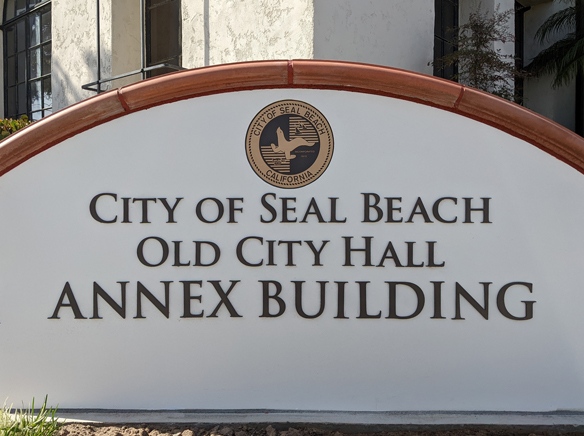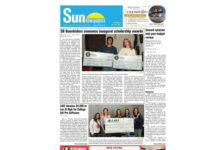The Seal Beach City Council this week voted 4 to 1 to end the temporary parklet program effective Jan. 31, 2023. District Two Councilman Thomas Moore cast the dissenting vote. The vote came at the end of a lengthy meeting that adjourned at 10:28 p.m.
City Manager Jill Ingram suggested that the council discuss the issue during the March 2023 strategic planning meeting.
City staff had recommended ending the parklet program on Jan. 31, 2023, according to a staff report by Community Development Director Alexa Smittle.
Smittle, in her report and in her remarks to the council Monday night, Dec. 12, 2022, raised concerns about staff time and resources to develop standards for parklets and enforce the standards, given the need for Coastal Commission approval and given that the state legal authority allowing cities to have parklets will expire on Jan. 1, 2024.
According to Smittle, the temporary program was set to expire when state COVID restrictions on restaurants were lifted.
According to Smittle, there are now 14 parklets on Main Street.
Smittle told the council there was mixed input from the community. She acknowledged that both sides raised valid points.
According to Smittle, said staff would not know until they tried to request a development permit, but the California Coastal Commission generally thinks parking is important.
Smittle argued that the state had dealt staff “crushing” blows with mandates that need to be fulfilled. She said she could not recommend going forward with the program.
Public comment
The decision about the parklets was not part of a public hearing. However, parklet opponents and supporters alike spoke out during the public comment segment of the council meeting. There’s not enough space to quote everyone.
During the meeting, Abbey owner Tom Rowe requested a six-month stay to work with staff and the subcommittee.
Craig Lyons of Catrina Café said many customers prefer eating outdoors. He estimated they would lose up to 25% of their revenue without parklets. He argued one of the few good things to come out of COVID was outdoor dining.
Matthew Terry, a parklet supporter, argued that parklets would boost revenue for the city. He cited a long list of things that used to take place in Seal Beach, including the kite festival. Terry asked the council to not let the parklets be another cool thing that Seal Beach used to have.
Joyce Parque argued the city should charge rent for the space.
Jim Caviola said parklets were empty 80% of the time. He described the parklets as a grab of public land.
Diana Newton, of Bay Hardware, said there was a lot of miscommunication going on. She said they are temporary parklets and said the key word was temporary. Newton said many owners of parklets had successful businesses before they had parklets. Newton also said she had not seen studies of the environmental impact of parklets.
Official comments
In an email the day after the meeting, District Two Councilman Thomas Moore explained his dissenting vote.
“Many of the residents in my district enjoy the parklets and the atmosphere that it brings to Seal Beach. I have not heard any complaints about parking be-sides those related to the Christmas parade,” Moore wrote.
“I realize that it takes City resources to do this additional task and the council agreed to look at this again before the end of March to try to restart something that makes sense. I also understand the concern about some of the parklets not being maintained or used,” Moore wrote.
“If the restaurants are required to pay for the space, then I suspect the parklets would reduce down from 14 to 7-8 which seems manageable,” Moore wrote.
“Based on last night’s discussion, it is possible restaurants may again have parklets in the summer and until the end of the allowed timeframe up until January 1st, 2023 set by AB61. There was discussion that the topic would come back early in 2023 and at the strategic planning session in March, however my no vote was [based on] the fact that it will be difficult to restart this once all of them are taken down without providing more specific direction at the meeting last night,” Moore wrote.
District One Councilman/Mayor Joe Kalmick said he thought there would be a path forward on parking. He said no one gets rich having a business on Main Street. He said he still plans to fight to have parklets. He argued that he represents both supporters and opponents of parklets. He said he had to defer to the needs of staff. He said he hoped his friends with restaurants would understand.
According to District Four Councilwoman Schelly Sustarsic, residents of College Park East say they don’t come downtown anymore.
District Three Councilman Mike Varipapa asked why the city could not wait until January 2024. He argued that the parklets had been here for about three years at no cost to businesses. Varipapa said he would like to temporarily terminate the temporary parklets.
Moore said he thought the staff’s previous proposal for standards was good.
Smittle, however, said she couldn’t recommend spending staff time to establish standards.
City Attorney Craig Steele argued the only legal authority to have parklets was valid until Jan. 1, 2024. Steele said there was a big push for something that would last for a few months.
Moore expressed the opinion that parklets increased the number of people on Main Street and the time they hang out on Main Street.
Varipapa suggested charging a fee for parklets.
Steele said the council would have to adopt a fee, then the city would have to amend the permits for the parklets, then the city would have to collect the fees, and shut down those owners who did not comply.
Varipapa proposed a $2,000 fee for parklets.
City Manager Jill Ingram suggested going back to this issue in March, assuming the council approved the staff recommendation.
Steele said all the council had to do was adopt the resolution. He said there was no way to clean up without the parklets going down.
District Five Councilwoman Sandra Massa-Lavitt said she loved the parklets. Massa-Lavitt said Seal Beach did not have the money to fix everything. She said she was going to vote for the resolution.
Background to meeting
Prior to the meeting, there was an attempt by parklet supporters to save the program.
Some restaurant owners have gathered signatures on a petition to keep the program. Tom Rowe, owner of The Abbey, said in a Dec. 11 phone interview that several restaurants were gathering signatures. He did not know at the time how many signatures had been gathered.
He said they wanted to show support for the outdoor dining parklets—not just support from restaurants but also the community.
Rowe said they were working on preventing the city from pulling the parklet program in January. Rowe said he thinks a plan could be put together in 30 to 60 days.
There is also an online petition to keep the outdoor dining parklets, apparently started by an individual named Taylor Haynes. As of noon, Tuesday, Dec. 13, the online petition had received 142 signatures.
Community Development Director Smittle made her case for ending the parklet program in her staff report to the council.
“The City’s temporary dining parklet program was implemented extremely quickly out of necessity to help support businesses during an unprecedented pandemic,” Smittle wrote.
“Records indicate that 28 food and beverage establishments opened up parklets when the program was initially launched,” Smittle wrote.
According to Smittle, some businesses have eliminated their parklets.
“Assembly Bill 61, signed into law last year, extended pandemic-related business relief efforts, specifically allowing reductions in parking requirements to accommodate outdoor dining through January 1, 2024. The Coastal Commission has acknowledged the legislation,” Smittle wrote.
“However, beginning January 1, 2024, the City would need permission, in the form of a Coastal Development Permit (CDP), from the Coastal Commission to allow parklets to continue in parking spaces,” Smittle wrote.
“It would likely take the better part of a year to prepare a CDP application for Coastal Commission approval to permanently use parking spaces for parklets, and it is unlikely that the Commission would approve such a request,” Smittle wrote.
Rowe expressed the opinion that if the city went to the Orange County Board of Supervisors and showed them signatures from elected officials, the Coastal Commission might be open to allowing parklets to continue.
As of 2:20 p.m., Monday, City Clerk Gloria Harper reported that the city had received 20 email comments on the parklets. The city continued taking public comments.
At an Oct. 20, 2022 meeting of the Parklet Subcommittee, several individuals (some speaking more than once) spoke out on the issue. The Sun counted approximately 17 speakers at the October meeting—most of them opposed to keeping the parklets.
At that time, city staff proposed putting a mitigation fee into a special fund for Main Street improvements. Smittle told the Oct. 20 meeting that coming up with a fee for restaurant square footage was challenging.
Restaurant owner Tom Rowe, in a recent phone interview, expressed the opinion that the square footage was not well thought out.
He also said he was looking for more balance from the parklet subcommittee, which he would like to see expanded to include members from Main Street.
Rowe is opposed to wood platforms for parklets. He also said there is a need to look at umbrellas for parklet spaces. He argued that what is wanted is something that looks good and is sustainable.
“Many parklet owners have actively expressed support for outdoor dining and believe the space is important to their continued success,” Smittle wrote.
“While restrictions on indoor dining ended more than a year ago, many diners still prefer to eat outdoors, some for health and safety reasons, and others simply to enjoy the weather and ambiance of Main Street,” Smittle wrote.
According to Rowe, what everyone is looking at on Main Street is not what they want or expect. According to Rowe, the current parklets weren’t designed to be built to last for three years.
“Conversely, several non-restaurant businesses on Main Street believe the parklets continue to negatively impact their business by reducing available parking and blocking lines of sight to their storefronts,” Smittle wrote.
“Others have stated they feel the parklets detract from the unique Main Street environment, and the intent of the temporary parklet program was to assist food and beverage establishments during an unprecedented pandemic, and not intended to remain on a permanent basis,” Smittle wrote.
“Realistically, it would be March 2023 before construction of a platform parklet could begin, with an expected cost at a minimum of $15,000, and likely more to meet design standards, offering only a nine-month window of operation,” Smittle wrote.












